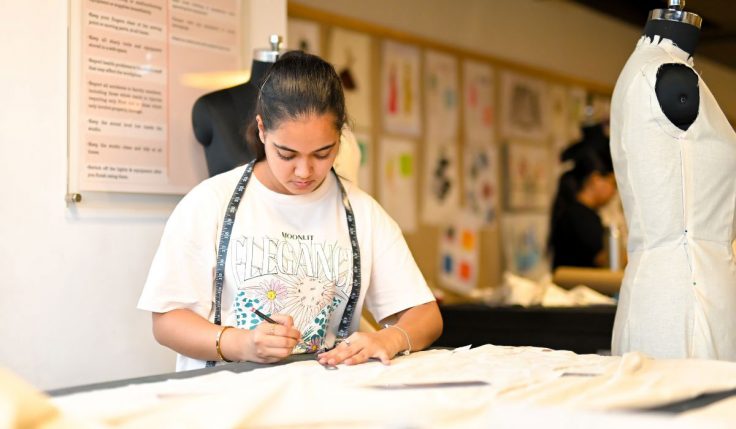The world is constantly changing, ever-evolving in the digital age; thus, the experience that a user derives when interacting with websites, applications, and software is very critical. It is where a Bachelor in UI/UX Design helps equip you with the required skills and knowledge, making you design user-centered designs that are not only pretty but also functional and intuitive. If you’re thinking about pursuing a career in this dynamic field, here is an exhaustive overview of what you would learn in a bachelor degree in UI/UX design and the career opportunities you will have at your fingertips.
What You Will Learn in a Bachelor’s Program
Design Principles: One of the main components of any bachelor in UI/UX design program is also an understanding of principles of design. Color theory, typography, composition, and visual hierarchy will be explored, providing an essential understanding to create beautifully pleasant yet effective interfaces.
User Research: UI/UX design is actually based around the understanding of user needs. Here, you’ll learn various methodologies related to the assessment of user research through surveys, interviews, and usability testing. With insights into the target market, you will be enabled to make some fairly wise design decisions.
Interaction Design: In a bachelor’s in UX design, you study how people interact with digital products. You learn to create wireframes, take on prototyping, and design easy navigation systems that people can easily understand. You’ll learn to make interactive experiences that enhance user satisfaction.
Usability and Accessibility: In this field of UI/UX, creating designs that could meet all users needs is the ultimate goal. Explore techniques in usability testing and learn to make your products accessible to people with disabilities. That is how you’d make sure your designs are inclusive and user-friendly.
Tools and Software: Much of your curriculum will be learning industry-standard design tools and software – Adobe XD, Sketch, Figma, and InVision, among others. With these, you’ll effectively be able to take your ideas and implement them into high-quality designs.
Project Management and Collaboration: Usually, UI/UX design is done in collaboration with developers, marketers, and other stakeholders. You’ll learn how to manage your projects, communicate with others, and, most importantly, how to present your designs to various stakeholders.
Portfolio Building: Last but not least, usually, there is a big deal on the development of a professional portfolio in the bachelor’s UI/UX design program. This is critical in proving your skills to any employer while portraying that you understand design principles.
Where a Bachelor in UI/UX Design Can Take You
A Bachelor inUI/UX Design will satisfy a wide area of career paths across diverse industries, since the skills gained will enable the graduate to apply it to dynamic and rewarding positions. Some of which include:
The Role of the UX Designer The UX designer will work primarily on discovering user needs, building interactions and making seamless flows. In the UX role, the activities involve user research, wireframing, and testing designs to ensure these meet users’ expectations and, therefore, make them easier to use.
User Interface Designer You will design interfaces that blow users away in this role. But remember that the visual elements you produce should support the seamless overall user experience. Work very closely with UX Designers.
Interaction Designer The Interaction Designers are interested in the nature of user engagement with a product. Your job would be to design intuitive interfaces that promote meaningful interactions and elevate the degree of user satisfaction.
Usability Analyst You would here try to analyze the research of how people engage with digital products. You would provide insights using data collected on user behavior for improved usability and effectiveness for solutions.
Front-end Developer If you are good at designing aspects of the User Interface, then you break through that barrier between design and implementation with an experienced front-end developer. This position requires a good hold of the use of HTML, CSS, and JavaScript along with your designs to present to the world.
Design Consultant As a Design Consultant, you will advise companies on their strategy in terms of design while sharing your insights with a multitude of clients for improving customer experiences and digital products.
In addition to these roles, graduates from the User Experience (UX/UI) program can explore various specialized career paths, including:
User Researcher: Conduct studies to gain deeper insights into user behavior and preferences.
Design Manager: Oversee design projects and teams, ensuring high-quality outputs and effective collaboration.
Information Architect: Organize and structure information for optimal accessibility and user navigation.
Wireframe Expert: Create detailed wireframes that outline the design and functionality of digital products.
Voice UI Designer: Focus on developing user interfaces for voice-activated technologies, enhancing interaction through voice commands.
Visual Designer: Craft the visual identity and aesthetic elements of products to ensure alignment with brand standards.
Automotive UX Designer: Specialize in user experience design within the automotive industry, focusing on in-vehicle interfaces and technologies.
Haptic UI Designer: Design tactile feedback experiences in user interfaces, enhancing user engagement through touch sensations.
Chat UI Designer: Create conversational interfaces for chatbots and messaging applications, ensuring intuitive interactions.
Information Visualization Specialist: Present complex data in engaging and easily understandable formats, enabling users to derive insights effectively.
A Bachelor in UI/UX Design can be instrumental in generating graduates well-prepared to enter a broad and evolving labour market, utilize their skills in creating significant and meaningful user experiences for a wide variety of sectors.
Conclusion: Bachelor in UI/UX design will endow you with all the basic and vital skills that set you on the edge of fast-changing a rapidly emerging industry. Design UI/UX learning brings a satisfying career full of impact on the world through improving the interaction between technology and human and their overall experience in general. Of course, there’s so much here in UX design, UI design, or consultancy. Take the start today and help change the face of the digital world!
The User Experience (UX/UI) program at Chitkara University is designed to prepare the students to be equipped with skills that would create evocative interactions between technology and humans. It’s a complete 4-year Bachelor of Design (B. Des) in UX, where one would learn to create skills in mapping a user’s journey and creating intuitive digital experiences. Our well-structured curriculum combines studio practice to hone down experience in the hands of all the latest technology. The course work would include some crucial components such as user research and analysis, principles of interaction design, visual design, prototyping, and usability testing along with a mandatory internship for real experience and industry exposure that can deep down make an understanding of the trends of the industry.
It features a lot of highlights, including access to high-end computer hardware and software for students to create custom-designed games and game components, a focus on studio practice to create and foster creativity and innovation, and an incredibly wide-reaching global partner network of Chitkara University that enables collaboration and practical training in research. The UX/UI graduates are well-suited to careers in user research, interaction designer, design manager, information architect, usability analyst, and much more. All these roles hold a pivotal position in molding the future of user experience design.






